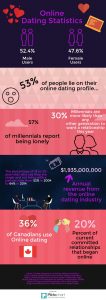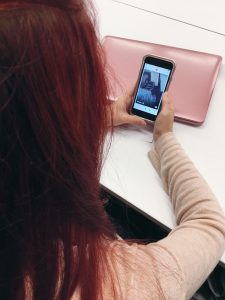BY TALINE LOSCHIAVO
For the young, modern single, online dating is the new norm. While it does provide more opportunity to connect with a wider variety of people, there are many downfalls to online dating.
According to Pew Research, online dating among millennials (18- to 24-year-olds) has tripled since 2013. Tinder, perhaps the most well-known mobile dating app, has created over 20 billion matches since its release in 2012, and estimates approximately 1.6 billion swipes per day. It is evident that people are spending a lot of time on these apps, but are these connections leading to actual relationships?

“I have several friends who go on these apps and talk to so many guys, but never actually meet up with them,” said Fatima El-Sabagh, a Creative Writing and Publishing student at Sheridan.
Shannon Tebb, a matchmaker and dating expert in Toronto affirms this notion. “People become overwhelmed with messages, only for them to fizzle out. So you have a larger network of singles at your fingertips, but it’s like walking into an ice cream shop with too many flavours to choose from.”
Too much choice can create both uncertainty and added stress, she explains.
First, a user must create a profile. Then, matches and connections must be sorted only to engage in a potentially neverending series of back-and-forths in the hopes of hitting it off with someone. Then an in-person meetup needs to be planned. Tebb puts it bluntly: “Online dating is like a job.”
For these reasons, online dating can quickly become less fun and more mechanical. This can be discouraging, and can even affect self-confidence when these apps aren’t producing the types of connections users desire. This results in less investment from all involved parties.
“I feel like it’s a worldwide acknowledgement that no one is taking it seriously,” said Cassandra Doudoumis, a Humanities major at York University. Doudoumis has been a dating app user for years. She says that it could be an incredible vehicle to establish relationships, and that the real issue lies in the way users are abusing these apps.
“I feel like there’s a huge lack of respect that no one is talking about. There’s no filter,” Doudoumis explained. “You can’t just jump in and say ‘I’m looking for a hookup.’ I mean, fine, but whatever happened to ‘hey how are you?’ You’re talking to a real person. This isn’t a service for you. It’s not a McDonald’s drive-through.”
El-Sabagh, who refuses to use dating apps of any kind, says that the lack of face-to-face interaction is another huge flaw with online dating.
“I knew right away that it wasn’t for me. People are so caught up on their phones, they forget about real life. I love looking for

ward to seeing the person I’m into on days where I know we could bump into each other.”
Hamza Ali, a General Arts and Science student at Sheridan shares her sentiment.
“There’s just such a lack of sincerity with online dating. You don’t know who’s behind the screen. It’s kind of scary. I’m more about going out and meeting people, and seeing them face to face.”
Another issue lies with the fact that these users are judged purely based on their photos. “All you have to go off of is a photo and tiny blurb,” Ali said. “Obviously appearance matters. You have to be attracted to this person, but after a while, it’s like ‘okay, what else?’ ”
It’s clear that online dating has its disadvantages. But what about its benefits? Tebb says that despite its flaws, it can be a great tool for the right people.
“For one, it’s time-savvy. It’s also great if you’re someone who doesn’t like loud environments where you’re going to be exposed to a lot of people.” It can be a truly valuable resource for individuals who are less social than others, or just too busy. “It’s also great practice.”
Regardless, Tebb still believes that the downfalls outweigh the good.
“Technology has hindered us from connecting authentically with one another. Millennials especially. They’re so used to being on their phones and interacting with technology. If you’re having issues with dating, just know that you’re not alone.”
